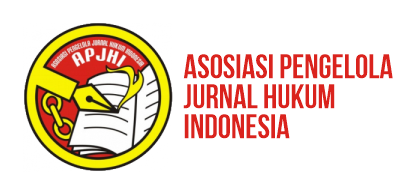Implementation of Terrorism Criminal Sanctions Methods According to Resolution 2560
Abstract
This study aims to find out the application of methods of sanctions against terrorism crimes according to resolution 2560 and national law. The method used in this study is a type of normative research that uses a legal approach as well as case studies. The results of this study show that the application of the 2560 sanctions method is still based on the previous resolution of resolution 2368 (2017) which asks all Member States to more actively submit a list of requests to the identification committee based on previous resolutions on improving the method of sanctions against terrorism crimes.
Keywords
Full Text:
PDFReferences
Book:
Eep Syaifullah Fatah, dkk. 2003. "Mengenang Perppu Anti Terorisme"
Aziz Syamsuddin. 2014. "Tindak Pidana Khusus". Jakarta: Sinar Grafika
J.G. Starke. 2010. Pengantar Hukum Internasional Edisi Kesepuluh, Terjemahan Bahasa Indonesia. Jakarta: Sinar Grafika
Malcolm N. Shaw. 2009. Interrnational Lawa (Sixth Edition). New York: ambridge University Press
Bruno SImma, et al., 2002. (eds) The Charter of the United Nations A Commentary.Second Edition.Volume I. Oxford: Oxford University Press.
Bardo Fassbender, "The UN Security Council and International Terrorism", dalam Andrea Bianchi (eds.), Enforcing International Law Norms Against Terrorism, Portland: Hart Publishing, 2004,
Kenneth Manusama. 2006. The United Nations Security Council in the Post-Cold War Era, Applying the Principle of Legality. Leiden: Martinus Nijhoff Publisher.
Sumaryono Suryokusumo. 2012. Studi Kasus Hukum Organisasi Internasional. Bandung: PT. Alumni
Manfred Nowak. 2003. Introduction to the International Human Rights Regime. Leiden: Martinus Nijhoff Publisher.
Sumber ini mencerminkan sumber hukum internasional umum yang terdapat dalam Pasal 38 ayat (1) Statuta Mahkamah Internasional, dalam Sigrun I. Skogly, Beyond National Borders: States' Human Rights Obligations in International Cooperation. Antwerpen: Intersentia. 2006.
D. Prakoso, and Nurwachid, Studi Tentang Pendapat pendapat Mengenai Efektifitas Pidana Mati di Indonesia Dewasa Ini, Ghalia Indonesia, 1984
Iqrak Sulhin, Mitos Penggentar Hukuman Mati dalam Politik Hukuman Mati di Indonesia, Marjin Kiri, 2016.
Journal article:
Ahmad, Ahmad, and Novendri M. Nggilu. "Denyut Nadi Amandemen Kelima UUD 1945 melalui Pelibatan Mahkamah Konstitusi sebagai Prinsip the Guardian of the Constitution." Jurnal Konstitusi 16.4 (2020): 785-808.
Ahmad, Ahmad. "Purifikasi Pemberian Amnesti Dan Abolisi: Suatu Ikhtiar Penyempurnaan Undang Undang Dasar 1945." Ius Civile: Refleksi Penegakan Hukum dan Keadilan 5.2 (2021).
Anggara, dkk., Politik Kebiajakan Hukuman Mati di Indonesia dari Masa ke Masa, The Institute for Criminal Justice Reform, 2017
Bungasan Hutapea, Alternatif Penjatuhan Hukuman Mati di Indonesia Dilihat dari Perspektif HAM, Jurnal HAM, 2016.
ggression is the use of armed force by a State against the sovereignty, territorial integrity or political independence of another State, or in any other manner inconsistent with the Charter of the United Nations, as set out in this Definition. Pasal 1 Resolution of the General Assembly No.A/RES/29/3314 tanggal 14 Desember 1974.
https://kantorhukum-akp.com/berita-macam-macam-sistem-hukum-di-dunia . Diakses pada14-11-2021
Humas Sekretariat Kabinet Republik Indonesia."Dewan Keamanan PBB Sahkan Resolusi Penanggulangan Terorisme Prakarsa Indonesia". https://setkab.go.id/dewan-keamanan-pbb-sahkan-resolusi-penanggulangan-terorisme-prakarsa-indonesia/
SafiraNur Halima, dkk. "Peranan Dewan Keamanan PBB Terhadap Kasus Kejahatan Perang Dalam Konflik Bersenjata Non Internasional Di Nigeria". Diponegoro Law Jurnal. Volume 5 Nomor 3. 2016
Security Coucil Committe Pursuant to Resolution 1267 (1999), 1989 (2011), and 2253 (2015) Concerning ISIL (DA'ESH),Al-QaidaandAssociatedIndividualsGroups Undertakings and Entities, "Procedures for Listing", https:// www.un.org/sc/suborg/en/sanctions/1267/aq_sanctions_ list/procedures-for-listing, diakses tanggal 2 Januari 2022.
Security Council Report. 2013. "UN Sanctions". http://www.securitycouncilreport.org/atf/cf/%7B65BFCF9B-6D27-4E9C-8CD3-CF6E4FF96FF9%7D/special_research_report_sanctions_2013.pdf
Wantu, Fence M., and Dian Ekawaty Ismail. "Constitutional Dialogue In Judicial Review At The Indonesian Constitutional Court: The Future Prospects." Journal of Legal, Ethical and Regulatory Issues 25 (2022): 1-8.
Wantu, Fence M., Novendri M. Nggilu, and Mellisa Towadi. "Indonesian Constitutional Interpretation: Constitutional Court Versus The People's Consultative Assembly." Journal of Legal, Ethical and Regulatory Issues 24.6 (2021): 1-11.
Wijaya, Ahmad, and Nasran Nasran. "Comparison Of Judicial Review: A Critical Approach To The Model In Several Countries." Jurnal Legalitas 14.2 (2021): 85-106.
DOI: https://doi.org/10.33756/eslaj.v1i3.13316
Refbacks
- There are currently no refbacks.
Copyright (c) 2019 Estudiente Law Journal

This work is licensed under a Creative Commons Attribution-NonCommercial-ShareAlike 4.0 International License.
| | | |
| | | | |
| | | | |
| | |
Estudiante Law Journal has been available at:
| | | | |
| | | | |
| | | | |
| | | | |




-2.png)
.png)





